Guernica Commons
Guernica Magazine of Arts and Politics has begun a new membership program – Guernica Commons for readers who want to support the online publication.
Franz Wright and Eugene O’Neill on Drunken Boat
 In addition to its regular offering of poetry, fiction, non-fiction, photo essays, and readings, Drunken Boat #12 online has new and unpublished poems, prose, and 14 images of hand-written drafts by Pulitzer Prize winning poet Franz Wright as well as a tribute to 20th century dramatist Eugene O’Neill entitled Celtic Twilight, with essays by over two dozen Irish-American authors and artists.
In addition to its regular offering of poetry, fiction, non-fiction, photo essays, and readings, Drunken Boat #12 online has new and unpublished poems, prose, and 14 images of hand-written drafts by Pulitzer Prize winning poet Franz Wright as well as a tribute to 20th century dramatist Eugene O’Neill entitled Celtic Twilight, with essays by over two dozen Irish-American authors and artists.
Brevity Essays on Craft
Check out these craft essays in the September issue of Brevity – online:
Exploring Intersections: An Exercise in Dismembering and Remembering Selves by Lockie Hunter
A writing exercise that has generated a great deal of excitement in my nonfiction classes is one I call the “self-adjectives” exercise. Its intent – to locate your interests and passions by listing self-descriptors – is similar to Sherry Simpson’s “tiny masters” exercise (Brevity craft essay, Issue 28) and rarely failed to spawn enthusiastic responses…until I began teaching at Warren Wilson College.
The Wonder of Geese by Bryan Furuness
One of the worst teachers I ever had was a man named Sam, who led my first writing workshop in graduate school. He used to stop class whenever geese flew past the window. “Geese!” he’d say, interrupting whoever was speaking, even if it was himself. The class would look dutifully at the geese, and some ass-kisser would say, “Wow,” or, “That’s really something, how they V up.” By the time we’d get back to the discussion, Sam would have forgotten what we’d been talking about, and everyone else would pretend to have forgotten, too. But not me.
Q&A: Using Tension and the Narrative Arc by Brendan O’Meara
An interview with Thomas French, Pulitzer prize-winning journalist and author of the New York Times bestseller Zoo Story: Life in the Garden of Captives, on the challenges of long-form journalism and how the writer uses tension in the story to create a dramatic narrative.
What Does Fiction Promise Us?
 Spurred by a reader’s letter, Senior Fiction Editor Ronna Wineberg takes on this question in her forward to the Fall 2010 issue of Bellevue Literary Review:
Spurred by a reader’s letter, Senior Fiction Editor Ronna Wineberg takes on this question in her forward to the Fall 2010 issue of Bellevue Literary Review:
Recently, a reader wrote us a letter and objected to a story we had published. She felt on of the characters in the story was unfairly dismissive of nurses. Her letter caused us to think about the BLR‘s goals. What can a reader expect from creative work about health, healing, and illness published in a literary journal?
Literary work about these themes differs from scholarly work, of course. Articles in medical journals must be fair, based on fact or rigorous research. A personal essay that appears in the BLR is grounded in fact as well, although the writer often expresses an opinion. But a short story and sometimes a poem create a fictional world. What does fiction promise us? How does the world of a story differ from a creative essay or scholarly article?
All readers bring their own experience to a work of literature. The reader who wrote to us understood the objective reality of the medical world and the importance of a strong partnership between doctors and nurses. But fiction does not always reflect reality. A character can think what he or she wants. A short story allows a reader to enter another person’s mind, to be privy to thoughts that might not otherwise be expressed.
Fiction doesn’t promise us a measured view of life or even a fair view, and it doesn’t always present a flattering portrait of people or a profession. A short story provides the reader with the vision of one author and the perceptions of the characters in that story. Readers, like our letter writer, may be offended by a story or feel that a character is insensitive. However, this is the beauty of fiction: it allows the reader to live another life, experience a new perspective, journey into unfamiliar worlds.
New Directions Releases First e-Book
 New Directions Publishing has released a new edition of Henry Miller’s The Colossus of Maroussi available from Amazon as their first official e-book title. It features everything that can be found in the paper edition: an introduction by Will Self, the new cover by Rodrigo Corral Design, and an Afterword by James Laughlin biographer Ian S. MacNiven (also the editor of the Lawrence Durrell/Henry Miller correspondence published by ND, as well as Lawrence Durrell’s authorized biographer).
New Directions Publishing has released a new edition of Henry Miller’s The Colossus of Maroussi available from Amazon as their first official e-book title. It features everything that can be found in the paper edition: an introduction by Will Self, the new cover by Rodrigo Corral Design, and an Afterword by James Laughlin biographer Ian S. MacNiven (also the editor of the Lawrence Durrell/Henry Miller correspondence published by ND, as well as Lawrence Durrell’s authorized biographer).
Upcoming e-book editions will include: Nathanael West’s Miss Lonelyhearts & The Day of the Locust, Nathaniel Mackey’s Bass Cathedral, and Muriel Spark’s Memento Mori.
Cara Wants Your Creative Community Projects
From Poet Educator Activist Cara Benson:
Looking for creative works/projects in community. Creating a line of study, here. Please send all suggestions my way (cbenson67[at]yahoo[dot]com). Examples include: Kaia Sand’s Portland poetry walks, Claudia Rankine’s Provenance of Beauty, Tree Museum in the Bronx. Also, artmaking/writing with community.
Interventions.
Re-inventions.
Decorations.
Instigations.
And just plain old creation, in situ. Of situ.
Thinking social justice and sustainability. Yes, art and politics. Praxis, please.
I’m very much interested in theory and essays. Even numbers (statistics) on things like poetry reducing recidivism. Creative projects fostering neighborhood ties. Fostering concern for care of community, ecology. Cultural influence on politics. Oh, the Humanities…
[Stay tuned for results – to be shared with NewPages.]
Boston Review Makeover
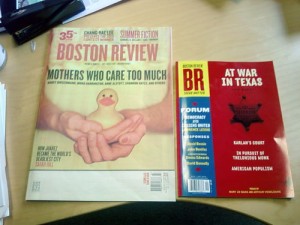 Hardly recognizable by the cover, Boston Review has gone smaller and glossy, adding the new subtitle: Ideas Matter – guaranteeing that while the outside may change, the same quality content will remain flowing through its pages. Read more about the format change here.
Hardly recognizable by the cover, Boston Review has gone smaller and glossy, adding the new subtitle: Ideas Matter – guaranteeing that while the outside may change, the same quality content will remain flowing through its pages. Read more about the format change here.
New Lit on the Block :: Mason’s Road
 Mason’s Road is an online literary magazine sponsored by Fairfield University’s MFA in Creative Writing and run by the graduate students of the program. Mason’s Road publishes fiction, creative nonfiction, poetry, drama, visual art, craft essays, writing exercises, and audio works, and will focus each issue on an aspect of the writing craft. Issues are published twice a year, in July and December, during residencies at Enders Island.
Mason’s Road is an online literary magazine sponsored by Fairfield University’s MFA in Creative Writing and run by the graduate students of the program. Mason’s Road publishes fiction, creative nonfiction, poetry, drama, visual art, craft essays, writing exercises, and audio works, and will focus each issue on an aspect of the writing craft. Issues are published twice a year, in July and December, during residencies at Enders Island.
Each genre section opens with a letter from the editors of that genre, each addressing some aspect of their work in the selection process – for fiction, a discussion of voice; for creative nonfiction, touching on elusive qualities; for poetry, a litany of poetic voices – raw, fresh, metaphysical, familiar; and for drama, an interest in screenplay writing with an exclusive interview with Pulitzer-Prize-winning novelist and screenwriter William Kennedy exploring “the hybrid and challenging form of the screenplay.”
Mason’s Road also includes a Radio Drama Cliff Hanger challenge in their drama section: “Your challenge – to pick up the story from this opening episode of our radio drama, or write the opening of a new radio drama. Whether the continuation of this script or a new one, it must be of true literary quality, entertaining, and provide another cliff-hanger ending…The Mason’s Road Players will produce the winning submission.”
This inaugural issue features fiction by Sandra Derrick, Laura Maylene Walter, Emily Davis Watson, Monet Moutrie, Mark Powell, Joel Kopplin; creative nonfiction by Brianna L. McPherson, Lia Purpura, Mary-Kathryn Bywaters, Michael Kortlander, Brandi Dawn Henderson; poetry by Lucas A. Gerber, Jeremy Francis Morris, Gladys L. Henderson, Jonathan Austin Peacock, Meredith Noseworthy, George Wallace, Robert Atwan, Julie E. Bloemeke, Shawnte Orion, Jason Michael MacLeod, Rhina P. Espaillat, J. Angelique LePetit, Paul Freidinger, Charlene Langfur, and Tim Hunt; artwork by Tinnetta Bell; and a conversation with Michael White on Voice/Persona.
Mason’s Road is accepting fiction, poetry, creative non-fiction, drama (stage or screen), art, craft essays, and audio drama from both emerging and established writers and artists for Issue #2 until Nov. 1, 2010. The issue will focus on strong settings – pieces that evoke a particular place or time.
Mason’s Road will award a $500 prize to the best piece of creative writing published in the first two issues of the journal.
Books :: A Story of Hope
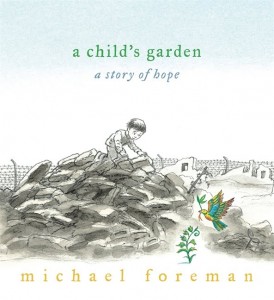 A Child’s Garden: A Story of Hope by Michael Foreman (Candlewick Press, 2009) is a beautifully written and illustrated children’s book about a young boy who nurtures a new green shoot he finds amid a garbage heap in a war-ravaged land. The vine grows to cover a fence that separates two communities – how they became that way is never told, nor is exactly where the story takes place. From the images – the landscape, the building structures (whole and crumbled), and military uniforms of the guards – it looks to be desert area – and the children are all portrayed as light-skinned.
A Child’s Garden: A Story of Hope by Michael Foreman (Candlewick Press, 2009) is a beautifully written and illustrated children’s book about a young boy who nurtures a new green shoot he finds amid a garbage heap in a war-ravaged land. The vine grows to cover a fence that separates two communities – how they became that way is never told, nor is exactly where the story takes place. From the images – the landscape, the building structures (whole and crumbled), and military uniforms of the guards – it looks to be desert area – and the children are all portrayed as light-skinned.
The vine grows to cover the fence, inviting birds and butterflies and children all to play together on either side of the fence, but the military guards from the “other side” of the fence come and tear it down. It regrows from seeds spread and shoots in the ground – first on the militarized side, where a young girl nurtures it, and the guards allow her to do so. Soon, new sprouts come up on the young boy’s side of the fence, and the vines from both sides intertwine. “Let the soldiers return,” thought the boy. “Roots are deep, and seeds spread… One day the fence will disappear forever, and we will be able to walk again into the hills.”
The illustrations begin with stark grey-brown “colorless” images and progress with the growth of the vine to vividly rendered watercolor scenes. The color is not overbearing – but as the story starts from bleak, peaks, then returns to bleak – the introduction of color is a stunning in appearance, and equally stunning in its loss as the vine is ripped from the ground. Of course, just as the vine shoots reappear through the earth’s surface, so too does the color seep back onto the page, ending in a joyful burst of color: the boy’s hopeful challenge of unification.
A Child’s Garden is a poignant story for both children and adults in a world where we are inundated with messages of cultural division and derision. This book provides a central concept – a simple vine – as a way to explore this very difficult topic with young adults.
Mapping the Writing Lives of First-Year College Students
Salt Hill Journal Blinded by the Light of Carlo Van de Roer
“Blinded by the Light” is a portfolio of photographs by Carlo Van de Roer and featured in Issue 25 of Salt Hill Journal. Each image is a photograph of a museum display and captures the reflection of the camera flash on the glass barrier. The image creates the illusion that the beings within the display are aware of the light as a result of its placement: wolves running through the snow-coveredforest appear to be chasing the light, a pair of bongos cautiously entering a thicket seem to be stopped, inspecting the light before progressing. A brilliant (no pun intended) concept deftly executed and worth picking up a copy of Salt Hill Journal to have your own well-produced copies of these photographs.
Cream City Review Contest 2010 Winners
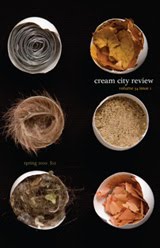 The Spring 2010 issue of Cream City Review features their annual literary prize winners, Haines Eason for the Beau Boudreaux Poetry Prize, Eson Kim for the David B. Saunders Prize for Creative Nonfiction, and Roger Sheffer for the A. David Schwartz Fiction Prize.
The Spring 2010 issue of Cream City Review features their annual literary prize winners, Haines Eason for the Beau Boudreaux Poetry Prize, Eson Kim for the David B. Saunders Prize for Creative Nonfiction, and Roger Sheffer for the A. David Schwartz Fiction Prize.
Word Literature Today International Short Fiction
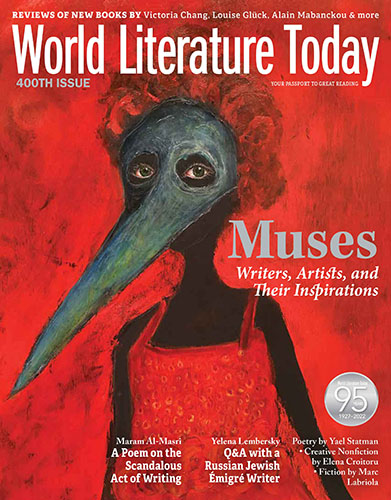 The September 2010 issue of World Literature Today includes a first-ever marquee section devoted to International Short Fiction, introduced by guest editor Alan Cheuse, who is best known for his frequent book reviews on National Public Radio’s All Things Considered. Authors contributing short stories include Ana Menéndez (Cuba/US), Raija Siekkinen (Finland), Nicole Lee (Malaysia), Andrei Cornea (Romania), Fatou Diome (Senegal/France), Cyrille Fleischman (France), Simon Fruelund (Denmark), Benjamin Percy (US), Amanda Michalopoulou (Greece), Alix Ohlin (Canada), and Ru Freeman (Sri Lanka), with original artwork by Edel Rodriguez on the cover and Danica Novgorodoff inside.
The September 2010 issue of World Literature Today includes a first-ever marquee section devoted to International Short Fiction, introduced by guest editor Alan Cheuse, who is best known for his frequent book reviews on National Public Radio’s All Things Considered. Authors contributing short stories include Ana Menéndez (Cuba/US), Raija Siekkinen (Finland), Nicole Lee (Malaysia), Andrei Cornea (Romania), Fatou Diome (Senegal/France), Cyrille Fleischman (France), Simon Fruelund (Denmark), Benjamin Percy (US), Amanda Michalopoulou (Greece), Alix Ohlin (Canada), and Ru Freeman (Sri Lanka), with original artwork by Edel Rodriguez on the cover and Danica Novgorodoff inside.
Yellow Medicine Review Queer Indigenous Voices
 The call was issued for Yellow Medicine Review: A Journal of Indigenous Literature, Art, and Thought – “The Ancestors We Were Looking for We Have Become: International Queer Indigenous Voices” – to be edited by Ahimsa Timoteo Bodhr
The call was issued for Yellow Medicine Review: A Journal of Indigenous Literature, Art, and Thought – “The Ancestors We Were Looking for We Have Become: International Queer Indigenous Voices” – to be edited by Ahimsa Timoteo Bodhr
Minnetonka Review Editor’s Prize
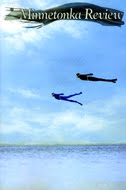 The Minnetonka Review Editor’s Prize generally recognizes writers who’ve not published a major book by awarding $150 to one prose and one poetry author from each issue. The awards for the Fall 2010 issue were given to Gary L. McDowell for poetry and Liz Prato for prose.
The Minnetonka Review Editor’s Prize generally recognizes writers who’ve not published a major book by awarding $150 to one prose and one poetry author from each issue. The awards for the Fall 2010 issue were given to Gary L. McDowell for poetry and Liz Prato for prose.
Prairie Schooner Honors Hilda Raz
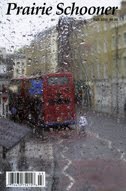 The fall 2010 issue of Prarie Schooner features a A Celebration of Hilda Raz, who has retired from UNL and from the editorship of Prairie Schooner as of August.
The fall 2010 issue of Prarie Schooner features a A Celebration of Hilda Raz, who has retired from UNL and from the editorship of Prairie Schooner as of August.
Raz was editor of Prairie Schooner since 1987 and the founding director of the Prairie Schooner Book Prizes in poetry and short fiction published by the University of Nebraska Press. In 1993 she was named the first Luschei Professor and Editor in the Department of English at the University of Nebraska where she has worked intensively with graduate students in the Ph.D. program. Raz, also received the 2010 Stanley W. Lindberg Award for Literary Editing. This award is presented to someone who has labored to uphold the highest literary standards in a magazine or small press.
Honoring her work and contributions to the literary community are submissions from James Engelhardt, Carole Simmons Oles, Ladette Randolph, Janet Burroway, Glenna Luschei, Mari L’Esperance, Sarah Kennedy, Biljana D. Obradovic, Kelly Grey Carlisle, Erin Flanagan, Pam Weiner, Tim Skeen, Lee Martin, Karma Larsen, Robert Pack, Nancy Welch, Floyd Skloot, R.T. Smith, Kara Candito, Kate Flaherty, Alicia Ostriker, Aaron Raz Link, Peggy Shumaker, and Maxine Kumin.
River Styx Contest Winners

River Styx 83 features winners of the 2010 Schlafly Microfiction Contest: Christopher Maggio (“Exclamatory Statements”), Katey Schultz (“Grimshaw on the Ice”), and Jessica McCann (“Night Window”).
Iowa Review Change of Editors
 Outgoing at The Iowa Review are Associate Fiction Editor Michael Fauver and Associate Poetry Editor Emily Sieu Liebowitz. No news as yet on incoming.
Outgoing at The Iowa Review are Associate Fiction Editor Michael Fauver and Associate Poetry Editor Emily Sieu Liebowitz. No news as yet on incoming.
Big Muddy 2010 Contest Winners
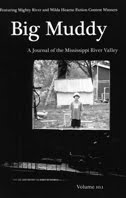 The newest issue of Big Muddy: A Journal of the Mississippi Valley features the Southeast Missouri State University Press’s 2010 Fiction Contest Winners. Kel Munger (“Missus Finn”) won the Mighty River Short Story Contes and Erica Lehrer won the Wilda Hearne Flash Fiction Contest. James H. Crews, Jr. is this years winner of the Copperdome Chapbook Contest for What Has Not Yet Left to be published by MSUP.
The newest issue of Big Muddy: A Journal of the Mississippi Valley features the Southeast Missouri State University Press’s 2010 Fiction Contest Winners. Kel Munger (“Missus Finn”) won the Mighty River Short Story Contes and Erica Lehrer won the Wilda Hearne Flash Fiction Contest. James H. Crews, Jr. is this years winner of the Copperdome Chapbook Contest for What Has Not Yet Left to be published by MSUP.
Alexie Banned in Stockton,Missouri
Sherman Alexie’s book remains banned in Stockton, Missouri.
Lynchberg College Residencies
The Thornton Writer Residency, a fourteen-week residency at Lynchburg College, including a stipend, is awarded annually to a fiction writer for the fall term & a poet or creative nonfiction writer for the spring term. The residency also includes housing, some meals, & round trip travel expenses. The writer-in-residence will teach a weekly creative writing workshop, visit classes, & give a public reading. Submit a copy of a previously published book, a curriculum vitae, a cover letter outlining evidence of successful teaching experience, & contact information for three references by October 15, 2010. There is no entry fee. If you would like your book(s) returned, please submit a SASE with sufficient postage. Visit the website for more information.
Ditching Bestsellers
Oxfam’s list of most donated bestsellers. At least some of them also make the Oxfam Bestsellers list.
Kentucky Arts Council Teachers Initiated Program Grants
The Kentucky Arts Council is offering Teacher Initiated Program grants for short-term artist residencies scheduled to take place in the spring of 2011. These grants give professional artists an opportunity to demonstrate their art forms and provide students and teachers repeated hands-on experiences in the making of art. Artists also collaborate with teachers to design and implement innovative programs that provide the tools to continue utilizing art across the curriculum after the residency is completed. Application Deadline: October 15, 2010
Witness (re)Turns to Three Issues Per Year
Witness had announced that in 2011, the publication will be “returning to its roots”: in addition to their annual print issue, they will begin publishing two online-only issues each year in May and September. The print issue will be devoted to a single topic, the theme of which will be announced at the opening of their submission period, and the online issues will feature new work of any theme.
“Blurring Borders,” their thematic print issue, will be available in January, followed by an online issue in May and another in September. Then, in January 2012, Witness will publish their next print issue, focused on disaster. New calls for submissions for all of these editions can be found at their web site.
By publishing online-only issues, Witness editor Amber Withycombe say the publication “will be able to cost-effectively share more writing with you and simultaneously grant broader access to the work we publish. We will make no distinction between the quality of the work that appears in our print and online issues, and contributors to each medium will be paid equally. Additionally, all of our online content will be free to readers.”
Tupelo Press Subscription Books
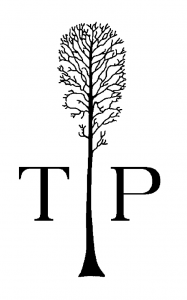 Tupelo Press has compiled their 2010 subscription list of books. For $99 you can get nine books – shipping included. A great deal on some notable authors’ works presented in high quality production: John Cross (Winner of the 2007 Snowbound Chapbook Award), Martha Zweig, Ilya Kaminsky, Gary Soto, Rebecca Dunham, Megan Snyder-Camp, Ellen Dor
Tupelo Press has compiled their 2010 subscription list of books. For $99 you can get nine books – shipping included. A great deal on some notable authors’ works presented in high quality production: John Cross (Winner of the 2007 Snowbound Chapbook Award), Martha Zweig, Ilya Kaminsky, Gary Soto, Rebecca Dunham, Megan Snyder-Camp, Ellen Dor
Millay Colony for the Arts Inaugurates Cave Canem Residency
 September 1, 2010 (Austerlitz, NY) Millay Colony for the Arts inaugurates a Cave Canem Residency beginning with the 2011 season. The Colony, which offers one-month residencies to six visual artists, writers and composers every month between April and November, has designated one of each year’s 48 coveted spots for a Cave Canem poet.
September 1, 2010 (Austerlitz, NY) Millay Colony for the Arts inaugurates a Cave Canem Residency beginning with the 2011 season. The Colony, which offers one-month residencies to six visual artists, writers and composers every month between April and November, has designated one of each year’s 48 coveted spots for a Cave Canem poet.
Founded in 1996 by poets Toi Derricotte and Cornelius Eady to remedy the under-representation and isolation of African American poets in MFA programs and writing workshops, Cave Canem is a home for the many voices of African American poetry and is committed to cultivating the artistic and professional growth of African American poets.
“We’re pleased to partner with the Millay Colony for the Arts to establish an annual residency for a Cave Canem poet,” said Cave Canem Executive Director Alison Meyers. “Opportunities for writers to work uninterrupted in tranquil surroundings are rare—so this residency is a very welcome addition to our program of services.”
Caroline Crumpacker, Executive Director of the Millay Colony, agreed. “All of us at The Millay Colony are honored to be working with Cave Canem, a generous/generative organization that has added so much depth and intelligence to the conversation around and within contemporary poetry. We very much look forward to welcoming Cave Canem fellows to our Colony and, thereby, expanding the conversation that takes place here.”
To Apply:
Cave Canem Fellows will go through the juried application process. One Fellow is guaranteed a residency. The rest of the Cave Canem Fellows who’ve applied will also be considered for additional spots.
Online application submission for 2011 Residency Program.
Application submissions via mail also available for 2011 season.
Cave Canem Fellows should indicate their status as such in the application. Details and form are available on the website. Applications must be postmarked or posted by October 1, 2010 for a month-long residency in 2011.
For more information, please call our Residency Director Calliope Nicholas at 518-392-3103 or email at residency-at-millaycolony-dot-org.
Zombie 101?
Zombies are the subject of a new course at University of Baltimore – ENG333 (really? half of 666?). “It’s a back door into a lot of subjects,” Jonathan Shorr, chair of the university’s school of communications design, says. “They think they’re taking this wacko zombie course, and they are. But on the way, they learn how literature and mass media work, and how they come to reflect our times.”
Fiction Residency George Washington University
The George Washington University 2011–2012 Jenny McKean Moore Writer-In-Washington (Fiction). An appointment beginning in the fall of 2011 for a writer of fiction to teach two semesters at The George Washington University as the Jenny McKean Moore Writer-in-Washington.
The successful candidate will teach a small fiction workshop each semester for members of the metropolitan Washington community. No tuition is charged for these workshops, which are not open to University students. The successful candidate will also teach two classes, one each semester, for students at The George Washington University.
This position is funded by an endowment from the Jenny McKean Moore Fund for Writers. The late Jenny McKean Moore, who had been a playwriting student at The George Washington University, left in trust a fund to encourage creative writing, & the trustees of the Fund helped design the program. The position is intended to serve as a fellowship for the visiting writer, since it involves only a moderate teaching load, & the program’s location at a university in the center of Washington should offer additional attractions for the writer.
The writer must have significant publications (fiction published by a well regarded press) & a demonstrated commitment to teaching. Like students in the community workshops, the writer need not have conventional academic credentials. He or she should reside in the Washington area while the University is in session, 1 September through early May. The historic Lenthall House, a 4-story Federal-era townhouse on campus, is normally available to the visiting writer through a subsidized rental agreement. The salary for 2011–2012 is expected to be $58,000 plus an attractive benefits package.
To be considered, applications for the 2011–2012 Writer-in-Washington position must be made by letter, indicating publications & other projects, extent of teaching experience, & other qualifications. The application must also include a resume & a selection of published fiction. Applicants are encouraged to send a book as their sample. Books will be returned if accompanied by an appropriate SASE. Only complete applications will be considered.
Review of all applications will begin on November 1, 2010 & will continue until the position is filled.
Applications should be sent to: Professor Gayle Wald, Chair, Department of English, 801 22nd St., NW (Suite 760), The George Washington University, Washington, DC 20052.
Emerging Adulthood Observed in Literature
Psychologist studying “emerging adulthood” of 18-to-20-something characterize by five features, according to Clark University psychologist Jeffery Arnett: identity exploration, instability, feeling in-between, a sense of possibilities and self-focus. Sarah Barmak explores this new area of study looking at characters in literature, authors, and supporting cultural influences: Why 30 is the New 20.
New Lit on the Block :: Rubric
Based out of The University of New South Wales, Sydney, Australia, Rubric is “an online interdisciplinary journal centred around the ideas of text and writing.” Previously only open to UNSW students, the new incarnation of Rubric is open to local and international work in all areas of creative writing and writing theory. The editorial team includes Josh Mei-Ling Dubrau, Kylar Loussikian, Ralph Stevenson, and Tanya Thaweeskulchai.
Rubric is a peer reviewed journal supported by the editorial board of Pam Brown (Associate Editor, Jacket Magazine), Paul Dawson (University of New South Wales), John Hawke (Monash University), Cate Kennedy (joining in 2011), Elizabeth McMahon (University of New South Wales), Stephen Muecke (University of New South Wales), Gordon Thompson (Victoria University, Melbourne), John Tranter (Editor, Jacket Magazine), and Alan Wearne (University of Wollongong).
This first issue of the new Rubric includes works by Alexandra Duggan, Amelia Streets, Kathleen Stewart, Narelle Goulden, Ralph Stevenson, Sam McAlpine, Shane Lee, Sylvia Petter, and Tamryn Bennet, whose graphic poem is llustrated by Skye O’Shea.
Rubric accepts works of poetry, prose, ficto-criticism, new media, and non-fiction, including short academic papers dealing with topics related to text and writing. Submissions are accepted from undergraduate, graduate, and academic sources and are peer reviewed by the appropriate member of Rubric‘s editorial board. The next deadline for submissions is October 1, 2010.
Art & Text: Nancy Spero’s Torture of Women
“Nancy Spero’s Torture of Women is an epic work. Two years in the making, it’s composed of fourteen panels and totals 125 feet. Juxtaposing image and text, Spero collaged imagery drawn from ancient mythology with hand-printed and typewritten words. She collected first person testimony culled from Amnesty International reports, news items on women missing or dead, definitions of torture from the twentieth and thirteenth centuries, as well as the retelling of violent Sumerian and Babylonian creation myths, such as Tiamat being disemboweled by Marduk to create the heavens. Completed in 1976, and published this spring by Siglio Press, Torture of Women bears witness to what is often officially denied or left unspoken. It reveals the presence of the silent consensus, which allows the violence to be state-sanctioned and eternally mythologized.” Guernica Magazine
Lady Chatterly Could Incite Prison Fights?
“A federal judge has declared unconstitutional a Virginia prison policy that denies inmates access to classic literature with sexually explicit passages but allows them to peruse Playboy magazine…Prison officials argued that sexually explicit materials ‘are considered valuable currency and used in bartering’ by inmates, and that the possession of such items can lead to theft and fights.” [Larry O’Dell, AP]
New Lit on the Block :: ESQUE
Under the superior editorship of Amy King and Ana Bozicevic, ESQUE is a newly launched online journal. The first issue features work by poets loosely grouped under the categories of OETRY (“the kitchen sink”) and IFESTO (“everything but”).
OETRY includes “the texts of poets’ native turf: poems, prose poems, verse-fragments, visual po-work.” Contributors to this first issue are Charles Bernstein, Bei Dao, Tamiko Beyer, Jackie Clark, Amy De’Ath, Lidija Dimkovska, Kate Durbin, Steven Karl, Natalie Lyalin, Filip Marinovich, Sharon Mesmer, Miguel Murphy, Ariana Reines, Saeed Jones, Tomaz Salamun, Evie Shockley, Heidi Lynn Staples, Leigh Stein, Cole Swensen, John Tranter, and Matvei Yankelevich.
IFESTO is “a field for poets to lucidly engage beyond their poetry. It may include: manifestos, rants, theoretical or personal essays, half-formed statements of poetics, travelogues, music or literary or art critiques, a recurring dream.” Contributors to this first issue are Jennifer Bartlett, Jillian Brall, Ching-In Chen, Ken Chen, Rachel Blau DuPlessis, Jennifer H, Fortin, Molly Gaudry, Roxane Gay, Matt Hart, Brenda Hillman, Dan Hoy, Ron Padgett & Olivier Brossard, Lars Palm, Joan Retallack, Brandon Shimoda, Anne Waldman, Franz Wright, and Carolyn Zaikowski.
ESQUE is a flash site, so allow a minute for the full content to load. Individual author’s works are available to print via PDF.
Sandburg-Auden-Stein Residency – 2012
Intensive Learning Term poet-in-residence program, from 30 April to 18 May 2012: 2012 Sandburg-Auden-Stein Residency.
During the 2012 Intensive Learning Term, the Olivet College Humanities Department will offer its sixth poet-in-residence position. The Sandburg-Auden-Stein poet will live on or near campus and teach ENG 247: Poetry Writing. The Sandburg-Auden-Stein poet will also host two public events: a public reading of his or her work and a stand-alone talk/discussion on a subject of his or her choice (publishing poetry, beat poets, def poetry, etc.).
An award of $3,100 (plus room and board) will be given to the 2012 poet. The Humanities Department faculty will evaluate the submissions and choose the winner. Poets who have published at least one book of poetry are eligible.
Submissions are due on Sept. 10, 2010, and should include the following: five poems from your most recent book, a single page personal statement regarding your poetics and teaching, a current résumé and two references. There is no entry fee. Please contact Kirk Hendershott-Kraetzer, Ph.D., Humanities Department chair, with your questions at (269) 749-7621 or khendershottkraetzer(at)olivetcollege(dot)edu
Electronic applications are strongly encouraged: .rtf, .doc, .docx formats accepted, .pdf preferred. Send to khendershottkraetzer(at)olivetcollege(dot)edu with “Residency application” indicated in the subject line.
Application materials also may be sent by regular mail to:
Sandburg-Auden-Stein Residency
Office of the Dean
Olivet College
320 S. Main St.
Olivet, MI 49076
CFS The Southern Poetry Anthology – Georgia
Editors Paul Ruffin and William Wright now seek submissions for the fifth volume in the series THE SOUTHERN POETRY ANTHOLOGY, featuring Georgia poets. The anthology will be published by Texas Review Press in 2012.
If you are a Georgia native, or if you have lived in Georgia for more than one year at any time, please feel free to send up to five poems for consideration. This anthology is not limited to those who have published before; first-time submitters are invited as well as those who have had full-length poetry books published by national presses. The only rules: Poems must be original and of high quality.
The editors will consider formal poems and free verse, as well as hybrid forms like prose poems. Poems about Georgia are not necessarily championed over other motifs and themes, as the editors wish for the “sense of place” to manifest in different ways, with different voices.
Please note that the success of this anthology depends a great deal on word of mouth. Notify your poetry students, poetry-writing friends, and gifted nemeses of this opportunity.
SUBMISSION REQUIREMENTS
Please submit your poems to the Series Editor and Volume Editor, William Wright, at vercimber-at-hotmail-dot-com. Please type “Georgia Poetry Submission” in your subject heading, then include your first and last names in parentheses. For example: Georgia Poetry Submission (William Wright). Unfortunately, snail-mail submissions are not possible given the nature of our editing process.
Please include a short cover letter within the text of the e-mail, as well as names of the poems submitted. Submit a maximum of five poems, and ensure that the poems are sent in .rtf (Rich Text Format), .doc (World 97-03), or .docx (Word 2007) format. Please include all submitted poems in only one attachment (this is important).
All submissions should include a brief bio (up to 150 words) after the poems and on a separate page. Please italicize names of publications.
The editors welcome both new and previously published work. However, if poems have been previously published, submitters must hold rights to them and provide full publication data (journal and/or book publisher, title of book/journal if applicable, date of publication). Finally, please make sure that each submission includes a preferred e-mail address and street mailing address within the text of the e-mail and on at least one page of the attached submission.
Submission Deadline: NOVEMBER 30 (Early submissions encouraged!)
Holding Links for Ransom
Back in the old days of Internet, used to be that you would write to someone whose site you admire and ask them to consider linking to your site. You would have already posted a link to that other site on yours because you were showing them that you admired and respected their work; you would like to think the feeling could be mutual. If it was, great, if not – eh, no big deal.
So why is it I get so many requests from people asking us to list them on NewPages, and when I visit their site – no link to NewPages? I do see links to other sites, but none to ours. Has there been a shift in polite protocol for link requests? Are links now held for ransom, or more a tit for tat procedure – IF you link to me, THEN I’ll link to you – ?
I know that’s not how we do it at NewPages. If we discover a site that we like and don’t have listed – well, by golly, we list it, then we let the person know we’ve listed it. We don’t hold the link for “exchange ransom.” If we’re linked back – that’s great – but we must still be of the totally old school that just likes to link and let folks know we appreciate what they do. Not only that, but we continue to check our links on a regular basis, since often times sites change or disappear or discontinue without letting their link pals know. So we manage and maintain all of these links ourselves. We do it because we know our readers depend on us for this. Decent links to decent sites.
So, how ’bout it – can we bring back this decency somehow in link requests?
CFS for New Academic Journal: Scribe
Scribe: A Journal of Writing Perspectives and Pedagogy in Two-Year Colleges is up an running!
The editors are looking for essays to be published in the first issue, coming out in December. If you are interested, please send your submissions to twoyeardigest-at-live-dot-com.
Submission Guidelines
• Submissions should be 500 to 4,000 words in length.
• All pages should be double-spaced and in current MLA format.
• The review process is blind. Please submit a cover page with your submission that includes the title, date of submission, your name, school or organization, and contact information.
• Include a biography that is 100 words or fewer.
• Manuscripts submitted to the Journal must be original and unpublished work of the author(s) and must not be under consideration by other publications.
• It is the author’s responsibility to obtain any necessary written permission for use of copyrighted material contained within the article.
•Send submissions and questions to twoyeardigest-at-live-dot-com. In the subject line, please put SUBMISSION. The deadline is Oct. 15, 2010.
Topics include, but are not limited to, the following:
• Pedagogy
• Technology in the Classroom
• Students, including the needs of the new generation
• Revamping Programs and Courses, including creating an AFA program
• Tenure and Unions
• Challenges and Successes, including personal experiences
• Assignments and Activities
• Basic Writing vs. Academic Writing
• Applying Writing to Other Majors
Pearl Short Story Prize Winner
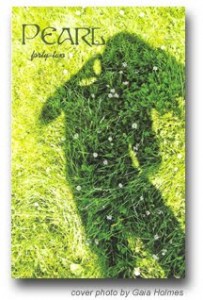 The Spring/Summer 2010 issue of Pearl is the “Fiction Issue” and features Ruth Moon Kempher, winner of the 2009 Pearl Short Story Prize.
The Spring/Summer 2010 issue of Pearl is the “Fiction Issue” and features Ruth Moon Kempher, winner of the 2009 Pearl Short Story Prize.
Alehouse Final Print Issue
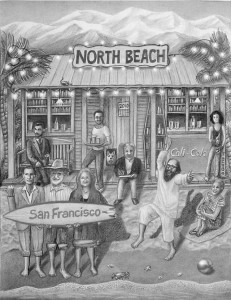 Editor Jay Rubin announced in Alehouse Number 4 that this will be the final print issue of the magazine: “While recessions may be good for poets, providing material for future poems, such economic downturns are detrimental for publishers. As a result, we’ve had to scale back our menu a bit, trimming out our usual list of essays. Next year, rather than risk the high waves of continued economic uncertainty, we plan to shutter our doors against impending storms. Regrettably, we will not publish a hard-copy issue in 2011. Instead, we’ll post an on-line version while maintaining our annual Happy Hour Poetry Awards.”
Editor Jay Rubin announced in Alehouse Number 4 that this will be the final print issue of the magazine: “While recessions may be good for poets, providing material for future poems, such economic downturns are detrimental for publishers. As a result, we’ve had to scale back our menu a bit, trimming out our usual list of essays. Next year, rather than risk the high waves of continued economic uncertainty, we plan to shutter our doors against impending storms. Regrettably, we will not publish a hard-copy issue in 2011. Instead, we’ll post an on-line version while maintaining our annual Happy Hour Poetry Awards.”
Save the Words
From the folks at Oxford Fajar via Oxford University Press: Save the Words, where you can “adopt” unused, unloved, and unwanted words such words as veprecose, obarmate, and buccellation – along with hundreds more. You can also sign up for a word-a-day and find helpful suggestions on how to help spread the word. All for free.
Audio :: PoemTalk
Newly released: The 35th episode of the PoemTalk series. This is a 25-minute audio podcast program, a discussion of Bruce Andrews’s “Center” from Moebius. The PoemTalkers this time are Tan Lin, Sarah Dowling, and Chris Funkhouser.
PoemTalk is a co-production of the Center for Programs in Contemporary Writing, the Kelly Writers House, and the Poetry Foundation.
Next time PoemTalk will be on the road, in Chicago, talking with three Chicagoans about Jennifer Scappettone’s rewriting of H.D.
Poebe Writing Contest Winners
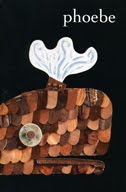 Phoebe, Fall 2010, features the winner of the Phoebe Winter Fiction Contest (Andrew Bynom), and the winner Greg Grummer Poetry Award (Aran Donovan) as well as honorable mention (Jendi Reiter).
Phoebe, Fall 2010, features the winner of the Phoebe Winter Fiction Contest (Andrew Bynom), and the winner Greg Grummer Poetry Award (Aran Donovan) as well as honorable mention (Jendi Reiter).
Is Pay-Per-Review a True Review?
Victoria Strauss at Writer Beware Blog takes on Pay-Per-Review resources, with a clear focus on PW’s new ‘feature’: PW Select: Opportunity of Exploitation?
Borderlands and The Translingual Aesthetic
Borderlands Texas Poetry Review (Number 34; Spring/Summer 2010) features a special section on translations from and into Spanish, from French, German, and Zapotec into English as well as works from authors who are “bilingual or, even translingual…and who write in two or more languages, and often self-translate. All these dual writers have a very unique aesthetic that lets them refine their dual creations, as they playfully go back and forth.” Editor Liliana Valenzuela goes on to discuss the joy and difficulty experienced by such work created by translingual writers as well as recognizing the work of several translators.
Black Lawrence Press Chapbook Competition Winner – 2010
Amelia Martens has been announced as the winner of the Spring, 2010 Black River Chapbook Competition with her manuscript Purgatory. The short list and long list for the competition have been posted on the Black Lawrence Press blog.
Writers in Exile: Washington Square
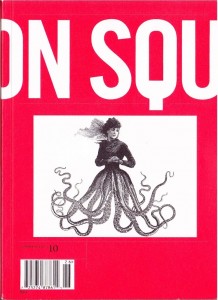 Washington Square‘s “Borderlands Issue” (Summer/Fall 2010) features writing that, rather than being interspersed throughout the issue, is given a devoted section of the magazine. According to Editor Martin Rock, though it may seem strange that the work is “cordoned” off, the “decision comes from our desire to give voice to writers in exile, be it self-imposed or otherwise, and to provide them with a space, both metaphorical and literal, to put up their feet and stay a while.” Those guests (with most works appearing in translation)include Meena Alexander, Jean-Luc Raharimanana, Drajica Rajcic, Avrom Sutzkever, Aung Way, Patrice Nganang, Soheil Najm, Huan Xiang, Idris Bazorkin, and an interview with Austin Woerner.
Washington Square‘s “Borderlands Issue” (Summer/Fall 2010) features writing that, rather than being interspersed throughout the issue, is given a devoted section of the magazine. According to Editor Martin Rock, though it may seem strange that the work is “cordoned” off, the “decision comes from our desire to give voice to writers in exile, be it self-imposed or otherwise, and to provide them with a space, both metaphorical and literal, to put up their feet and stay a while.” Those guests (with most works appearing in translation)include Meena Alexander, Jean-Luc Raharimanana, Drajica Rajcic, Avrom Sutzkever, Aung Way, Patrice Nganang, Soheil Najm, Huan Xiang, Idris Bazorkin, and an interview with Austin Woerner.
Lesbian & Bi Poets
From Jezebel online: Ten Lesbian & Bisexual Poets To Fall in Love With – complete with sidebar links to each and some great additional materials posted in the comments section.
Narrative Spring Contest Winners
 Winners of the Narrative Magazine Spring Story Contest:
Winners of the Narrative Magazine Spring Story Contest:
FIRST PRIZE
Scott Tucker I Would Be Happy to Leave This Asylum
SECOND PRIZE
Peter Grimes Victoria
THIRD PRIZE
Megan Mayhew Bergman Birds of a Lesser Paradise
FINALISTS
Elizabeth Benedict Death of a Deadbeat Dad
Mary Costello The Sewing Room
Marta Evans Intruder
Katherine Jaeger Ambition, Distraction, Uglification, Derision
Eli Lindert Tacos in Chicago
Alexander Maksik A Tobogganist
Jerry Mathes II Still Life
E. V. Slate The Ferry
Lynn Stegner The Anarchic Hand
Lori Tobias Going to the City
Upcoming Contests:
The Fall 2010 Story Contest, with $6,500 in prizes. Open to fiction and nonfiction. All entries will be considered for publication. Deadline: November 30, 2010.
The 30 Below Story Contest 2010, with $3,250 in prizes. All entries will be considered for publication. Open to all submissions from writers and artists age thirty and below. The contest runs from September 15 through October 29, 2010.
Writer Beware Reveals Media Error
Hear the one about the six-year-old who landed a million-dollar book deal? Well, Victoria Strauss over at Writer Beware Blog heard about it and thought it sounded a bit fishy, thus her follow-up: How the Media Gets It Wrong.
